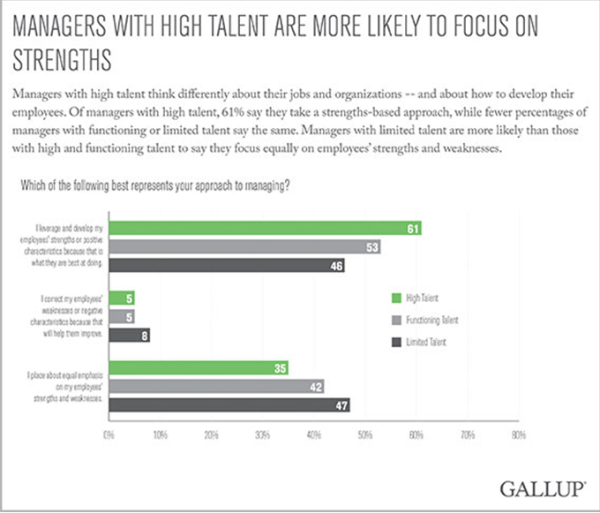Organizations usually fail at selecting the right people with management talent. A report by Amy Adkins in the Gallup Business Journal (April 13, 2015) suggests companies fail to choose the candidate with talent for the manager’s job 82% of the time. That’s a pretty discouraging statistic, as I posted previously.
If only one in ten candidates succeeds as a manager, then something’s seriously wrong with the way they’re picked. So I did some more research into what kind of talent makes for a good manager. Here’s what the Gallup report says:
Managers with high talent are more likely to focus on strengths. Managers with high talent think differently about their jobs and organizations, and they think differently about how to develop their employees.
When Gallup asked managers to choose the option that best represented their management approach, 61% of managers with high talent say they take a strengths-based approach, while fewer percentages of managers with functioning or limited talent say the same. Managers with limited talent are more likely than those with high and functioning talent to say they focus equally on employees’ strengths and weaknesses.
It makes sense and the research shows it to be true: When employees know and use their strengths, they are more engaged, have higher performance and are less likely to leave their company.
In a Gallup study of 1,003 randomly selected U.S. employees, nearly two-thirds (61%) of employees who felt they had a supervisor who focused on their strengths or positive characteristics were engaged — twice the average (30%) of U.S. workers who are engaged nationwide.
A manager’s approach to strengths has a profound impact on engagement, and that engagement has a profound impact on just about everything that matters to an organization’s long-term viability. Look around you and notice those managers who are successful.
Anyone who’s experienced success leading people to high performance will tell you. Let people know when they succeed, when they shine. They’ll be encouraged and even more engaged. And, of course, the opposite it true: point out their weaknesses and faults and you’ll get more of it.
It’s common sense, yet it continues to be uncommonly practiced. When it comes to spotting management talent, the candidates who focus on strengths are more likely to be successful as managers.
What do you see happening where you work? Are your managers focusing on your strengths? I’d love to hear from you. You can contact me here or on LinkedIn.

Did You Enjoy This Article?
Join thousands of other smart business owners like yourself & get our Proffittable Times newsletter.
It's filled with actionable content you can apply immediately.
Sign up now to get started!
– Coach Nancy











